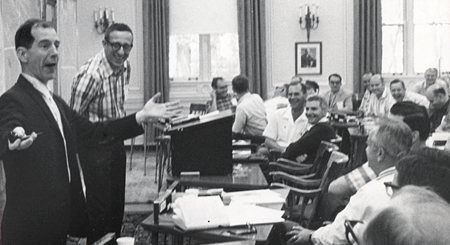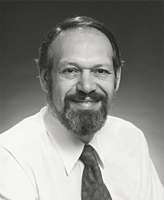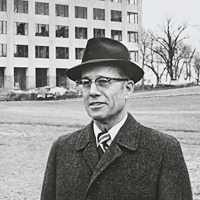Rise
of a management titan
1 | 2
Restatement
of purpose
As
the demolition crew moved onto the Evanston campus in June
1970 to dismantle Memorial Hall, onlookers may have wondered
if Joseph Schumpeter's economic theories of "creative destruction"
were being realized. For indeed the old structure was literally
being consumed to give birth to the new.
Memorial
Hall had stood near Sheridan Road and Foster Ave. since 1887,
first housing the Garrett Theological Seminary and then, in
1923, after a $100,000 facelift, opening its doors to accommodate
Northwestern's burgeoning School of Commerce, which had operated
in Evanston out of Harris Hall since 1915. But the program
had actually originated in 1908, located in downtown Chicago
in Tremont House at the corner of Lake and Dearborn. It had
begun as little more than a trade school, a response to what
Northwestern University President Edmund James indicated was
a dire social need.
"The average
business man is ignorant and inefficient and cowardly," claimed
James in 1902. "He is helpless in a crisis."
With an
operating budget of $5,000 and the support of some 60 Chicago
business leaders, notably Joseph Schaffner, university trustee
and a founder of Hart Schaffner and Marx, the commerce school
admitted 165 part-time students in its first year and charged
$75 per annum for tuition, requiring those enrolled to sign
a document attesting to their "good moral character."
Since
that time, the undergraduate business program had grown and
represented not only a proven source of revenue for the university,
but was now "very well respected," according to Professor
Wally
Scott, whose grandfather, Walter Dill Scott served as
Northwestern's president from 1920-1939 and produced path-breaking
research into the psychology of advertising and personnel
management.
Professor
Emeritus Lawrence G. Lavengood also notes the strength of
the program, recalling it as "premier" and one enhanced significantly
after 1950, in part through the support of the Ford Foundation,
which had grown into a national force for education and other
social causes.
Nevertheless,
Dean Barr's Business Advisory Council, itself part of a broader
Management Educational Policy Committee whose membership roster
read like a Who's Who of Chicago's senior business community,
had begun five years earlier exploring the future of business
education, determining that real-world demands called for
a more sophisticated manager than what the undergraduate program
was likely to produce.
"Northwestern
University should strive for an innovative and leadership
position in management education," the Council wrote in its
April 1968 "Proposed Statement of Recommendation." To accomplish
this end, the university should create a school of management
that would "encompass the development of managers, the conduct
of research, and the development of teachers of management
for organizations of all types - business, government, health
and education."
Given
the university's limited resources, the Council, chaired by
Jim Allen, recommended that rather than try to stretch itself
too thin with mediocre results across the board, Northwestern
should take a calculated risk and phase out the undergraduate
curriculum even though it was successful, and despite the
challenges of building a sizable new graduate program.
 |
| Another
era: Professor of Business History Gene Lavengood, left,
regales a class in the 1960s with the ready assistance
of Finance Professor Donald
P. Jacobs. Note the ashtrays and cigarettes on desks
and the pipe in Lavengood's hand. |
| |
The Council
based its recommendations upon its research - which included
a broad survey of business and education professionals - that
suggested public organizations faced similar challenges to
those seen in the business world. Furthermore, the complexity
and expansion of the non-business arena presented an "urgent
requirement for trained managers in nonprofit organizations."
What's
more, the Council noted the serious sociopolitical rifts,
including the debate over the Vietnam War, which was then
dividing the country. On many campuses, students wanted little
to do with the "military-industrial complex" and frequently
turned to law schools, rather than business schools, looking
to make a social contribution.
"The intellectual
questioning and striving of our young people today for new
answers and new directions, especially in regard to matters
of public concern, argues well for the appeal of ... a school
of management [which] might help to overcome the disenchantment
of some bright young people with careers in business," wrote
the Council in its recommendations.
Scaring
the hell out of people
The
decision to do away with a successful undergraduate program
seemed dubious to some, particularly those with vested interests
in the curriculum, such as faculty hired specifically to teach
the younger students. And some students themselves felt passionate
enough to protest the decision, which they saw as placing
their careers in jeopardy.
"Eliminating
the undergraduate program changed the faculty to a degree,"
says Ralph Westfall, who was associate dean for academic affairs
from 1965 to 1975. "It was clear that the MBA program was
going to be driving business education in the future, and
this is where you wanted to have your main focus."
To be
successful in this new mission meant recruiting the best research-based
faculty that would, in turn, attract the best students. The
school's Marketing
Department already boasted such paradigm-shifters as Philip
Kotler and Sidney
Levy, and even earlier had influential scholars that included
Richard Clewitt, Harper Boyd, Steuart Henderson Britt and
Westfall himself. Still earlier, Fred Clark's 1922 text, Principles
of Marketing, had helped establish the entire discipline,
while Delbert J. Duncan and Ira B. Anderson produced important
scholarship in the retailing arena. But this level of thought
leadership would now have to suffuse the school, and continue
extending the boundaries of management research.
 |
|
| The
arrival of Professor Stanley
Reiter in 1967 was a watershed event, and the school's
research-based faculty would soon hit its stride. |
|
| |
|
Westfall
was among those responsible for bringing in key faculty members,
including Stanley
Reiter, Morton
Kamien, Nancy Schwartz and David Baron, all of whom helped
create the school's potent Managerial
Economics and Decision Sciences Department (MEDS). The
rigorous analytical frameworks of this discipline would influence
all areas of the school, including complementing the important
contributions of the Organization Behavior Department, which
was instrumental in creating the famous Kellogg collaborative
learning model.
"We made
no bones about it when we talked to prospects: This was going
to be a publish-or-perish situation that they would be walking
into here," says Westfall. "If that wasn't what they were
looking for, then they didn't want to consider Northwestern.
If they were looking [to be part of a research-based team],
we had a good product to sell. We were very successful in
recruiting good people."
Indeed,
top-caliber faculty then soon attracted more talent, including
Mark
Satterthwaite, Ehud
Kalai and others.
"Stan
Reiter's arrival here in 1967 was a watershed event," says
Robert
Magee, the Keith I. DeLashmutt Distinguished Professor
of Accounting Information and Management. "Over the next 15
years, he and his fellow MEDS faculty members built arguably
the best economic theory department in the world."
Reiter
recalls his goals upon arriving at Northwestern. "I wanted
to be part of establishing the research foundations in an
MBA school," says Reiter, who was recruited from Purdue where
he had been part of a team that created that school's Department
of Economics. "The mission [at Northwestern] was to train
future managers. Well, in what? Are you going to show them
how to file? There were significant developments going on
in economic theory, statistics and operations research. But
these things were not so sharply separated or defined."
Says Reiter:
"I saw my mission here as bringing in the people to create
a new department out of the ashes of the old establishment,"
one that drew upon a range of quantifiable sciences that were
"foundational ... to lots of things that go on - or should
go on - in schools of management."
MEDS succeeded
marvelously.
"It also
scared the hell out of a lot of people," says Reiter.
New
Dawn
When Memorial Hall came down, more than a building disappeared.
The wrecking ball took with it the vestiges of the undergraduate
program and propelled the school into a future that was uncertain,
but clearly promising and ambitious.
By then,
faculty members were ready for this exciting change, says
Jacobs.
"Nobody
wanted to keep that building up," he recalls. "The wood was
creaky and the faculty offices weren't very nice. It was interesting
looking from the outside, but it probably lived 50 years beyond
its real life."
Faculty,
he says, embraced the hopes symbolized by Leverone Hall, the
newly constructed Evanston home of the full-time graduate
management program, which opened in 1972. Some $5 million
for the project had come in 1968 from Nathaniel Leverone,
the founder and president of Chicago-based Canteen Corp.,
a pioneering vending machine merchandiser. This initiative
formed part of a larger $180 million effort dubbed the "First
Plan for the Seventies," led by Northwestern President J.
Roscoe Miller.
| |
 |
| |
Modern
times: With construction on Leverone Hall nearly complete,
Associate Dean Ralph Westfall surveys the progress in
style, circa 1972. |
| |
|
Wally Scott
agrees that these changes brought a new vitality to the school.
"Getting out of downtown Chicago and bringing the MBA program
to Evanston gave you an opportunity to create a different kind
of culture," he says, adding that this kind of "constant reinvention"
has been one of the "remarkable characteristics" of Kellogg.
(The school did retain a downtown presence, of course, in the
part-time MBA curriculum, which remains vital today as The
Managers' Program, directed by Associate Dean Vennie
Lyons.)
Associate
Dean Emeritus Ed
Wilson, hired by Henderson in 1972 as director of admissions
and financial aid, also accents the move's impact on student
culture, which proved especially important as a unique hallmark
for the school. After Leverone Hall opened, "students now
had access in Evanston to the university library and recreational
centers, the religious centers, playing fields, all of which
really changed the character and quality of student life from
being urban to suburban."
Still,
some retained fond memories of Memorial Hall long after its
destruction.
"The Little
Red Schoolhouse was an affectionate name," Lavengood said
in an interview more than a decade later. "But the building
was not a meager one. It had generous halls and there were
many large classrooms with windows you could actually open
and shut. We had high ceilings for high thoughts. There were
surprising nooks and crannies and sudden turns that I think
preached a useful moral lesson, which was: Be sure you know
where you are going."
The Kellogg
School did. It was headed to international acclaim and would
soon land at the No. 1 spot in the rankings.
In
upcoming issues of Kellogg World: We continue exploring
the events and people responsible for taking the Kellogg School
to worldwide renown.
|



